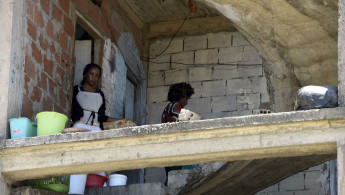Algeria continues fierce crackdown on illegal migration
Algerian authorities have continued to raid a number of neighbourhoods in the capital Algiers where migrants live, following a government pledge to end illegal immigration in the North African country.
2 min read
The crackdown has been criticised as being a 'hunt for the black man' [AFP]
Algerian authorities have continued to raid a number of neighbourhoods in the capital Algiers where migrants live, following an announcement in November pledging to end illegal immigration to the North African country.
Hundreds of men, women and children have been arrested in slums inhabited by sub-Saharan migrants and sent to a detention camps on the outskirts of Algiers, local sources reported.
"As soon as you open the door, they take you away. I was taken with all my luggage, everything was stolen: the computer, the things in the house, the refrigerator, the money – they took everything," a migrant, who was sent to a camp in the town of Tamanrasset, was quoted by France Info as saying.
The raids have created a climate of fear among sub-Saharan Africans living in Algeria, a country whose relative safety and stability provided an alternative destination for migrants unable to travel to Europe.
Prior to the crackdown, however, conditions for migrants in Algeria were already difficult, with many finding themselves living in derelict buildings, abandoned construction sites and being exploited by employers.
"Our life boils down to that. We carry bags of sand [and] stones. We do all the jobs nobody wants to do," one unnamed Guinean migrant told France 24.
 |
| Many migrants in Algeria live in abandoned buidings and derelict sites [AFP] |
"The bosses call us 'comrades', [and] we have the impression that it means 'slaves'. But we have no choice, they are the only ones who accept to give jobs to illegal migrants."
According to Algerian police, around 150,000 migrants have fled war and economic difficulties in their countries to live in Algeria's large cities. Only 7,000 people hold refugee status in Algeria.
The government crackdown on migrants, many of whom are from sub-Saharan Africa, has been described by one Algerian union, SNAPAP [Autonomous National Union of Public Service Staff], as "the biggest hunt for the black man since independence".





 Follow the Middle East's top stories in English at The New Arab on Google News
Follow the Middle East's top stories in English at The New Arab on Google News


